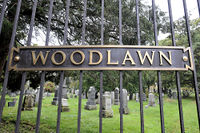501(c)(13)
501(c)(13) is an Internal Revenue Service (IRS) tax exemption status that applies to nonprofit cemetery companies and crematoria. These organizations are "operated exclusively for the benefit of their members or ... not operated for profit."[1]
A 501(c)(13) cemetery company may not operate a business unrelated to the direct burial of the deceased, including a mortuary. However, the company may sell grave markers, flowers and other memorabilia as long as they are used within the cemetery and the profits are applied to property maintenance. [2]
Individual contributions to 501(c)(13) entities are tax-deductible as long as they are devoted to the support of the entire organization, not the purchase or maintenance of a specific burial plot.[1]
Examples
- Woodlawn Cemetery (Bronx, N.Y.)
- Ferncliff Cemetery Association (Hartsdale, N.Y.)
- Lakewood Cemetery Association (Minneapolis, Minn.)
- Mount Carmel Cemetery Association (Glendale, N.Y.)
- Union Dale Cemetery (Pittsburgh, Pa.)[3]
See also
External links
Footnotes
- ↑ 1.0 1.1 IRS.gov, "Chapter 25. exempt organizations determinations manual, Section 13. cemetery companies," accessed September 21, 2015
- ↑ IRS.gov, "Other section 501(c) organizations," accessed September 21, 2015
- ↑ National Center for Charitable Statistics, "Organizations by IRS subsection 501(c)(13)," accessed September 21, 2015
| |||||||





